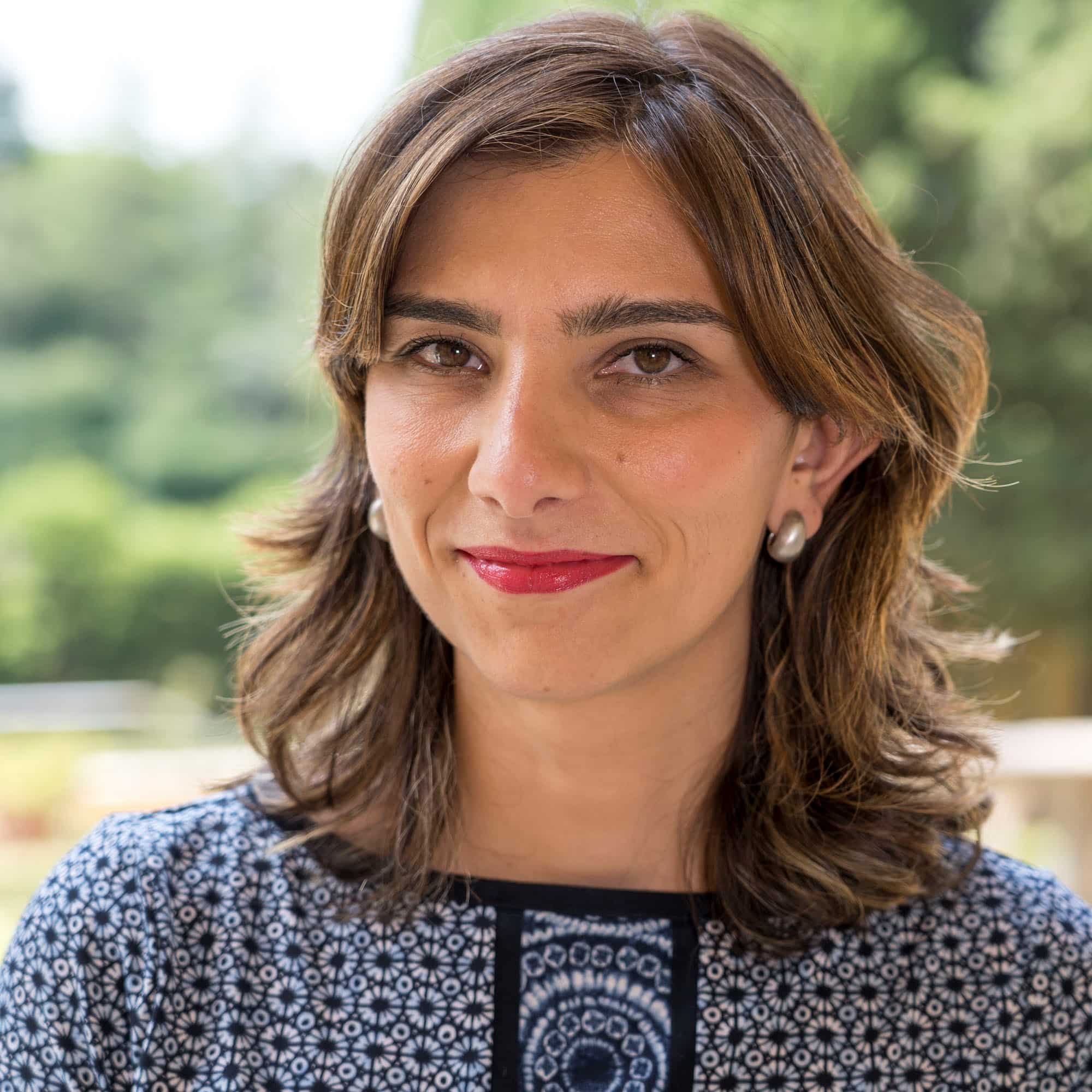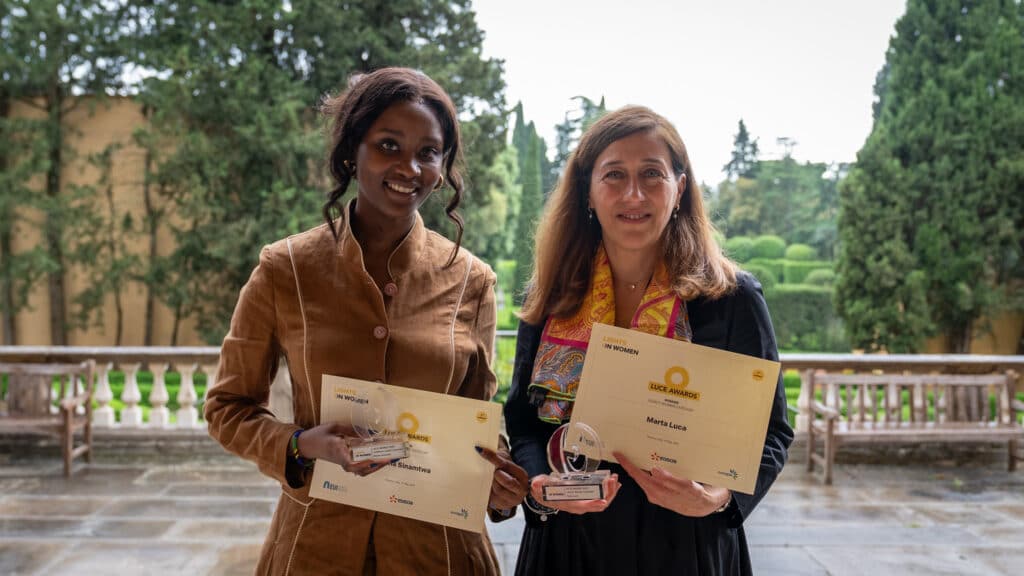Powering Change: Women Leading the Just Energy Transition
This is the second installment of the Topic of the Month: Reflections on the FSR Spring Policy Dialogue
Our LUCE Awards event has blown out its third birthday candle.
Like every child at that age, LUCE is gaining awareness about herself, her powers and the boundaries around her.
Out of the metaphor, the Florence School of Regulation, in the context of the recent Spring Policy Dialogues, proudly celebrated the third edition of its Lights on Women LUCE Awards.
The 2025 winners
Like every year, the FSR LUCE Awards offers an opportunity to celebrate two outstanding female professionals working or studying in the field of energy, climate and sustainability.
Rhona Sinamtwa and Marta Luca are our 2025 LUCE Awards winners, for the Emerging Talent and Legacy Women categories respectively. Rhona is a Master student in Environmental sustainability at the University of Ottawa, Canada. She set up a project called AfroCycle, a closed-loop textile upcycling initiative aimed at tackling textile waste on a grander scale. AfroCycle transforms discarded textiles into valuable resources, reducing the need for new material production while championing a circular economy.
Marta Luca, currently General Manager of the SNAM Foundation, developed her career in the private sector by acquiring increasing responsibilities especially in the human resources field. Her path includes engagement in education, formation and talent acquisition, but also specialisation as mentoring and career development advisor, always with a focus on social responsibility as well as equality, diversity and inclusion.
LUCE is not only about a moment of celebration and recognition, it also offers an opportunity, a moment of silence, to reflect on the role of women in the energy sector.
At a time of extreme geopolitical polarisation, in which the values of Equality, Diversity and Inclusion are being questioned (if not attacked), it is a privilege for FSR – while an important responsibility at the same time – to reaffirm once again, via this very special annual event, our commitment and support to achieving gender equality in the energy sector.
Just energy transition, does gender matter?
The LUCE Awards also hosted an academic panel debate on the concept of just energy transition, with a special attention to the gender dimension. As the moderator Andris Piebalgs clarified, all transitions must include men and women, as well as other categories of the society, in order to be considered just. Spanning different contexts and geographical regions, how to ensure that energy transition brings benefits in an equal measure, is still a widely debated question.
Even in the most advanced regions, the energy transition doesn’t impact all citizens at the same speed, nor with the same modalities. It is therefore essential to ensure that the transition to more sustainable, decarbonised energy systems doesn’t become a further element of discrimination between poor and rich, the young and the old generations, between male and female energy users. Transition does rhyme with participation, and no one should be left behind.
As Prof. Josephine van Zeben reminded us in the welcome speech: “Achieving more sustainable energy systems is one of the most pressing challenges of our time. But it is not merely a technological or economic endeavour – it is fundamentally a societal one. This means ensuring that all voices are heard, that innovation is both inclusive and impactful, and that those shaping tomorrow’s policy are as diverse as the societies they serve”.
On this basis, Petra Schwager offered some reflections as well as some first-hand experience from the UNIDO projects that she managed over the past few years – and which aim at facilitating progress in access to energy from girls and women in specific projects or geographies. She also insisted on the importance of having well-balanced teams when managing projects focusing on energy transition and the value of sustainability.
Using Rebecca Gaghen’s (IEA) words: “How can we embark on such a great challenge with such major societal transition, if we only have half of the population on board? There’s a lot of talent out there and we should ‘go the extra mile’ in trying to understand how to catch their attention and bring them onboard”.
Facilitating women’s access to the energy sector
Talent acquisition indeed was one of the points debated during LUCE. We had the chance of hearing first-hand experience on what companies and international associations do to improve the recruitment process as to attract applications and interest from female students or early professionals. In a largely male dominated sector, where women roughly cover 20% of the total workforce in energy industry worldwide, it’s necessary to make an effort and encourage women to enter a sector that may not look so appealing to an external female observer. Edison and Eurogas, Lights on Women donors and sponsors of the event, contributed with concrete ideas, such as: flexible time policies, mentorship from internal and external role models, company gender quotas and targets, zero tolerance for gender-based bias harassment and collaboration with schools as to encourage women’s interest in STEM subjects.
On the latter, Barbara Terenghi raised a crucial point: “Women’s choices are driven by social and cultural model in the society. This means that even if in many cases women are very good at STEM subjects, they are not confident enough to apply for certain job vacancies, because they’re not encouraged by the existing role models. So, in fact, there’s a problem of self-confidence and not only a problem of cultural model according to which women prefer other sector than the too technical ones”.
Improvements are necessary at company culture level: “Via gender mainstream policies, making sure that women are present at every discussion, not just in disseminating policy, but in actually creating it, that they are at the table at every stage in the process is something that came out of our [Eurogas] polling. And by organising events that are targeted towards women, but also include men and involve men in the discussion” added Constance Long from Eurogas.
All the panellists agreed on a very crucial point: for more women to enter the energy sector and contribute to a just transition, their path needs to be encouraged more evidently and more convincingly starting in the early school years and accompanied throughout their career – step after step towards higher responsibility and senior positions.
As Barbara Terenghi’s inspiring words summarise: “The idea is that women can do all of this. And that they can get advice in the organisation in order to create their career path, to become more confident in a strategy and to progress in the organisation. This is the reason why we speak about processes and also culture, because the two things for us go together”.
In conclusion, a transition can only be just and fair if all voices are heard. In the energy sector, women’s voices still remain feeble and far from the rooms where important decisions are taken. Whenever this happens, it is a loss for the whole society, as diversity and inclusion are at the core of human progress and advancement. However, steps forward are being made, as well as creative solutions to shrink this gap and promote more balanced representation at all levels.
A more diverse energy sector is a sector where better decisions are made, where scientific research advances more courageously and where equal opportunities reach those who want to seize them. The energy transition is an opportunity to find and invest in these resources and accelerate the pace towards a fairer and just society.






